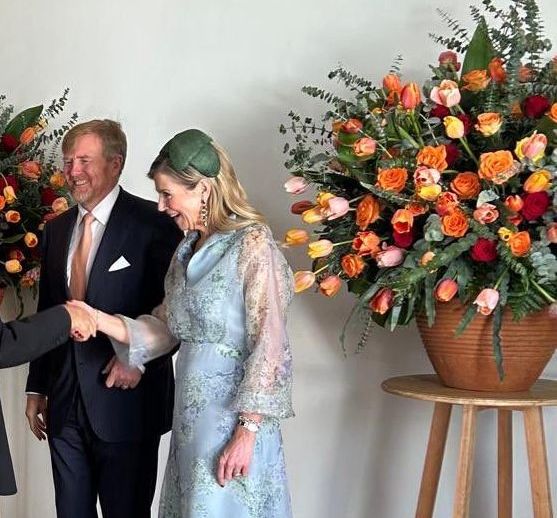“Are there no secret agents of the Kenyan government here?”, asks a nervous youngster just before the conversation begins with King Willem-Alexander and Queen Máxima, the royal couple of the Netherlands visiting Kenya in March. But in the relaxed atmosphere of the living room of the Dutch ambassador in the Kenyan capital Nairobi, where ten young people meet the royal couple on a Tuesday morning, the tension quickly evaporates.
“My voice speaks of reason, not high treason,” begins spoken-word artist Steve Biko (33). “The rulers of Kenya who are supposed to protect us are murdering us. But we are no longer afraid.”
The king made no secret of the fact that his visit is controversial. “We know that more than twenty thousand petitions have been sent to cancel our visit. But this is a state visit, from one country to another. If you don’t come, you are turning your back on Kenya.” After which Máxima promised to convey the words of the ten young people to the Kenyan authorities.
Joshua Okayo (29) refused the invitation from the Dutch embassy to meet the royal couple. “The state visit legitimizes the violation of human rights in Kenya. The king shakes hands with Kenyan President William Ruto and there is blood on that. Some of us call those who did speak to the king traitors.”
Flowers to Aalsmeer
Okayo is one of the most visible leaders of Gen Z, the designation of both a generation (born between 1995 and 2010) and a protest movement in Kenya. He was kidnapped and tortured by a national security service the day after a mass meeting of Gen Z in June. More than sixty protesters were felled by police bullets.
This repression puts the king in a quandary. He arrived with a trade delegation of fifty businessmen and three ministers; the Netherlands is Kenya’s largest trading partner in the EU, mainly because of the flowers that are flown from the country to Aalsmeer every day. “This visit is about making money, not about human rights,” Okayo sneers. “Talking to young people for half an hour is just a cover.”
In Kenya, the rise of Gen Z has opened a new chapter in its political history. Gen Z came into the picture last year with a demonstration that attracted tens of thousands of people, not only in Nairobi but throughout the country. Led by creative digital natives, the youth protested against higher taxes and denounced the corruption of the political class that shamelessly enriches itself. The youth do not organize themselves on the basis of tribal origins, as is common in Kenyan politics. They are non-partisan and operate without leaders.
The government of President William Ruto initially did not know what to do with this new phenomenon. It sent the army onto the streets and hired rioters to disrupt Gen Z gatherings. When the wave of youthful resistance continued, the government began kidnapping, killing and torturing leading figures. Kidnappings have now stopped, but a number of young people are still missing.
Gen Z is not the first generation to protest abuse of power. Kenya is a relatively free country in the region of East Africa, but not a well-developed democracy. Willy Mutunga (1947), former activist and chief justice, speaks of a reign of terror in Kenya. “Since independence in 1963, human rights violations have been taking place here. That is nothing new,” he says. Under previous dictatorships, those in power arrested politicians and activists and, albeit under false pretenses, brought them before the courts with charges. “For Ruto, the constitution is an inconvenience, he does not abide by the rulings of the courts. Through the kidnappings, he makes it clear to Gen Z that if they start a rebellion again, they will be killed.”
Young, fearless and everywhere
They were young, fearless and everywhere. But under pressure from the repression, Gen Z leaders have been protesting mainly from behind their computers for several months now. It is therefore difficult to estimate how widespread the call for the cancellation of the royal visit was.
The young people continue their resistance against Ruto in small communities. “We call our action model bullshit politics,” says Okayo. “We occupy the offices of corrupt representatives and let their phones fill up with messages. In this way we try to activate young people against the government, maybe we will form a political party later and Gen Z will take over power in Kenya.”
Other young people have turned their backs on Gen Z. “They are spoiled children,” sneers social worker Robert Ochola, himself from the generation before the turn of the century. “You can’t divide people based on their age group, but you can divide them based on class. And Gen Z is part of the emerging middle class, with very different interests than the vast majority of young people who are dirt poor. You can already see that some of Gen Z are being bribed by the corrupt political class. That’s how it has always been in Kenya.”
The ten young people come out of the conversation with the royal couple relieved. “We have not become traitors because of this conversation with the king. We are doing it for our fatherland,” says one of them. But in the hostile environment of Kenyan politics, they feel fear again. “We are worried about what will happen to our recommendations for better governance.” The days after youth fall over each other to comment on the meeting, some calling it a betrayer, other calling it useful.
This article first appeared in NRC on 18-3-2025

